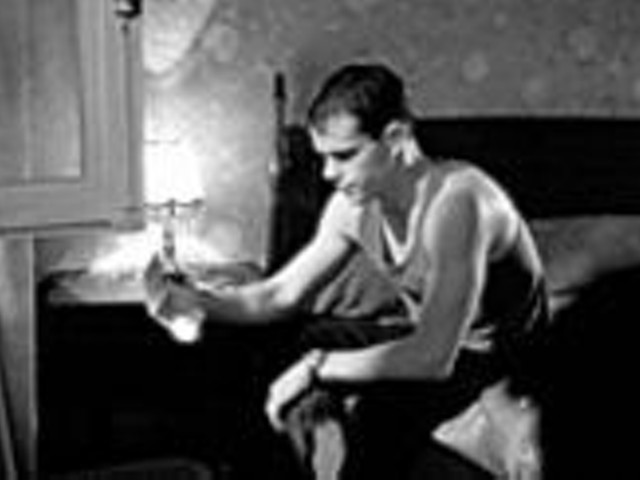It's unfortunate, then, that the latest film adaptation of the story, simply titled Bartleby, mines none of these potential themes and instead plays Melville like a sitcom. It's not that director Jonathan Parker doesn't respect Melville. He clearly does, judging by the fact that the movie begins with a picture of the author, then slowly delivers factoids about his life. But his respect seems to be that of a person who knows merely that Herman Melville equals great literature. Parker updates the setting in an attempt to make the film relevant today, without fully understanding what it was that made the story relevant in the first place -- Mike Judge's Office Space makes for a cannier update than this.
Stepping into the role of Melville's anonymous narrator is David Paymer, who is appointed to the head of the public records department at the film's beginning. Paymer's new workplace resembles a Lego structure -- all primary-color paints. Distractions for the eye include a mural of deer in the forest and a window that looks out into an underground parking lot. The boss' office in back gets a slightly better view -- that of the building's dumpster. To add to the surreal nature of the place, the entire office building is atop a creepy-looking mountain amid intersecting freeways -- a postmodern Castle Frankenstein. And thanks to a faulty air-conditioner, the whole place shakes.
Paymer has three employees, who, unlike him, have names: Ernie (Maury Chaykin), a fat guy whose own wind-up toy collection nearly induces him to have coronaries; Rocky (Joe Piscopo, with Ronald Reagan's hair), a suit-wearing tough guy with a high-tech massage chair possibly borrowed from Dr. Evil; and Vivian (Glenne Headly), the token chick absent from Melville's original story, who flaunts her large vocabulary as she flirts with big shots like supervisor Mr. Waxman (Seymour Cassel). All are suitably wacky, but this isn't a sitcom (even if it's shot like one), and we don't have a full season to see their underlying humanity develop.
With workloads increasing, Paymer is under pressure to hire someone new, and when Vivian objects to the lack of truth in their want ad (describing the workplace as "dynamic"), he lets her write a new one, which is unflinchingly honest about the mundaneness of the place. As a result, the sole applicant is Bartleby (Crispin Glover), a cadaverous shut-in who barely speaks and left his last job at the dead-letter office because "the office moved" (a funny throwaway, so of course the film has to repeat it later to make sure you heard). Initially efficient, Bartleby soon becomes trouble when, for no apparent reason, he starts answering all instructions with the line "I would prefer not to," and starts spending an inordinate amount of time simply staring at the ceiling.
A key problem here is that the film is adapting a short story, and, as such, has to pad it out to feature length -- it still comes in at a scant 82 minutes, about 52 minutes too long. First-time director Parker has the occasional flash of inspiration -- the surreal closing shot, or a homeless man begging change so that he may photocopy his dissertation -- but fails to catch fire with his flat cinematography and buffoonish caricatures. A cameo by Haiku Tunnel creator Josh Kornbluth is a big mistake, as it reminds us of that film's superiority. Parker even adds on a new ending that's woefully misjudged, one that seems intended to be extra ironic, or perhaps even to vindicate Melville, who died in obscurity. The fact that Moby-Dick's now on every high-school English curriculum is apparently insufficient.
The casting of Crispin Glover, meanwhile, is a calamitous decision for the material. Though Glover is always fun to watch, especially for those who have heard the stories about how genuinely insane he is, he makes Bartleby look like a serial killer. Melville clearly intended for the narrator's sympathy for Bartleby to at least seem reasonable, even if Bartleby himself remains somewhat inscrutable. Parker and Paymer fail to pull that off, as it's never clear why Paymer doesn't run from Bartleby at first sight.





